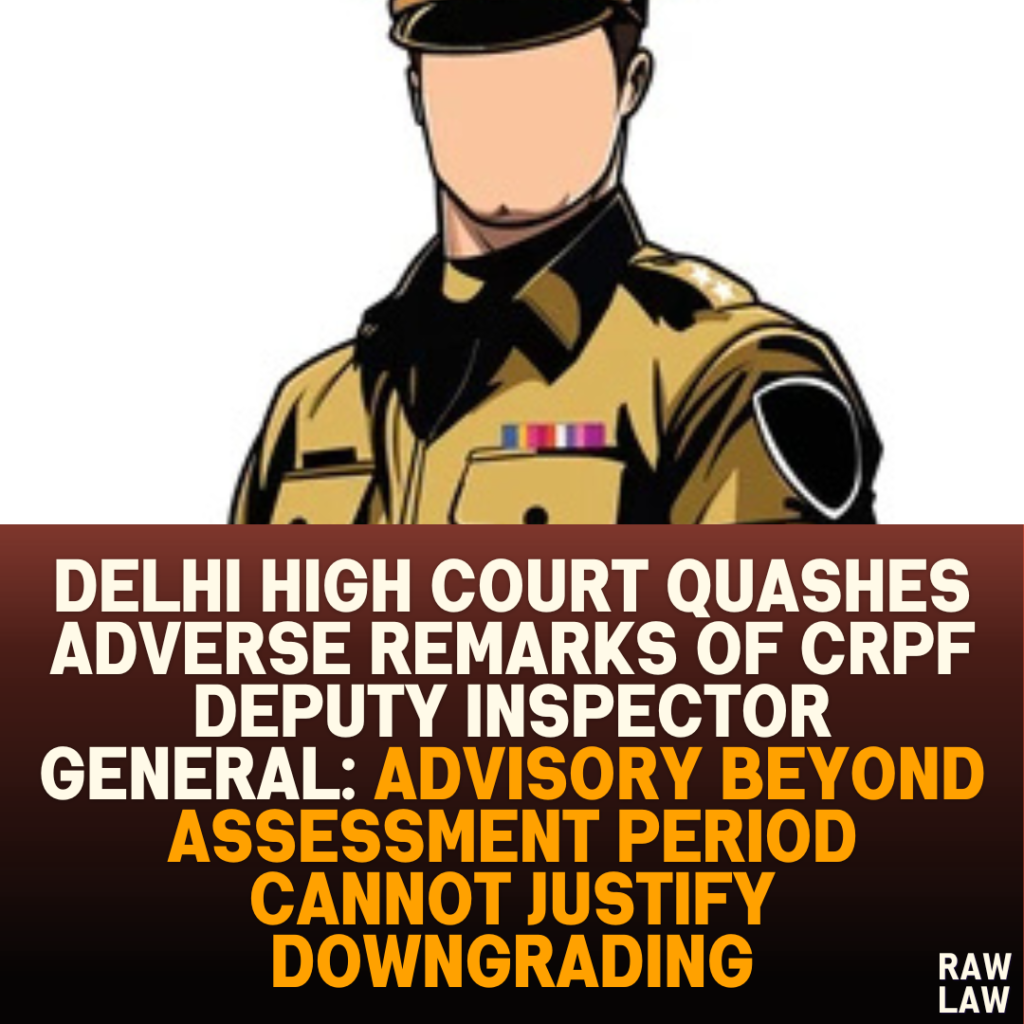Court’s Decision:
The Delhi High Court quashed the adverse remarks in the petitioner’s Annual Performance Assessment Reports (APAR) for two periods: from 31.10.2019 to 31.03.2020 and from 01.04.2020 to 10.09.2020. The court held that the advisory issued to the petitioner on 18.07.2020, which formed the basis of the adverse remarks, was issued beyond the assessment period of the first APAR and was later expunged. As such, it could not be relied upon for downgrading the petitioner in either of the APARs.
Facts:
The petitioner, serving as a Deputy Inspector General (DIG) in the Central Reserve Police Force (CRPF), sought relief from the Delhi High Court regarding adverse remarks in his APARs. For the period from 31.10.2019 to 31.03.2020, the Reporting Officer assigned the petitioner a grading of ‘Good’ with adverse remarks about his interpersonal skills and communication style. These remarks were endorsed by the Reviewing Officer, and no comments were made by the Accepting Authority. The petitioner represented against these adverse remarks, but his representation was rejected. For the subsequent period from 01.04.2020 to 10.09.2020, the petitioner was graded ‘Very Good,’ but similar adverse remarks were again made, and his representation was once again rejected.
Issues:
Whether the adverse remarks recorded in the petitioner’s APARs for the impugned periods were justified.
Whether the advisory issued on 18.07.2020, beyond the period of the first APAR, could serve as the basis for adverse remarks.
Petitioner’s Arguments:
The petitioner argued that the adverse remarks in his APARs were unjustified and based on an advisory dated 18.07.2020, which was issued beyond the assessment period for the first APAR. The petitioner also contended that he had consistently received gradings of ‘Very Good’ or ‘Outstanding’ in his past APARs, and the adverse remarks were inconsistent with the positive evaluations of his performance and conduct. Additionally, the petitioner submitted that the advisory had been expunged, and thus, it should not have been used to justify adverse remarks.
Respondent’s Arguments:
The respondents argued that the adverse remarks were based on the petitioner’s unsatisfactory behavior, which persisted despite regular warnings. They contended that the remarks were supported by the Reviewing Officer and Accepting Authority, who agreed with the Reporting Officer’s evaluation. The respondents also maintained that the petitioner’s past performance had no bearing on the evaluation of his performance during the impugned periods.
Analysis of the Law:
The court examined the relevant Office Memorandums (OMs) issued by the Department of Personnel and Training (DoPT) and the Ministry of Home Affairs (MHA), which provide guidelines for recording APARs and issuing advisories. The court found that the advisory issued on 18.07.2020, being outside the assessment period of the first APAR, could not have been relied upon by the Reporting Officer while recording adverse remarks.
Precedent Analysis:
The court reiterated established legal principles that an APAR must be recorded objectively and fairly, based on the officer’s performance during the relevant assessment period. It emphasized that an advisory issued beyond the assessment period cannot be used as a basis for adverse remarks.
Court’s Reasoning:
The court noted that the adverse remarks in the petitioner’s first APAR were primarily based on the advisory dated 18.07.2020, which was issued after the assessment period and later expunged by the MHA. The court observed that the remarks were inconsistent with the petitioner’s prior gradings and found that the Reporting Officer had recorded the remarks in a casual manner. Additionally, the court pointed out that the petitioner’s performance in the subsequent APAR was graded as ‘Very Good,’ indicating that the adverse remarks were unjustified.
Conclusion:
The Delhi High Court quashed the adverse remarks in both APARs and directed that the petitioner’s APARs for the periods from 31.10.2019 to 31.03.2020 and from 01.04.2020 to 10.09.2020 should not be taken into account for any purpose. The court also set aside the impugned order dated 14.09.2021, which had rejected the petitioner’s representation.
Implications:
This judgment reinforces the principle that adverse remarks in an APAR must be based on objective assessment and within the relevant period. The decision also highlights that any advisory issued beyond the assessment period and later expunged cannot be used as a basis for adverse remarks.
